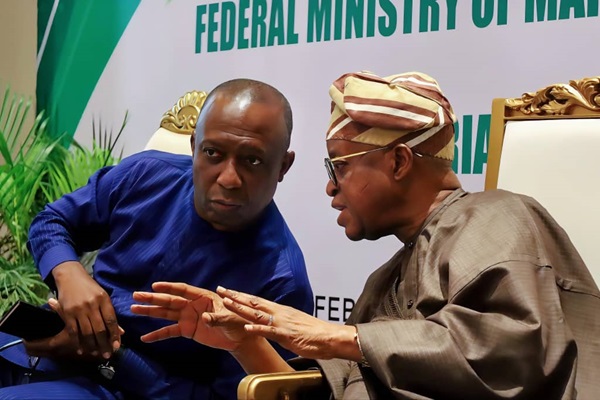
The Federal Government is set to unlock the vast potential of the maritime sector as a key driver of national prosperity in line with Africa’s Agenda 2063.
The Minister of Marine and Blue Economy, Adegboyega Oyetola, made this disclosure today in Lagos during an interactive session with the Nigerian Guild of Editors. He stated, “The vision of the ministry is to ensure that the country’s marine resources are harnessed sustainably to position Nigeria as a premier maritime nation.”
To lay a solid foundation for this vision, Oyetola revealed that the Ministry, through extensive stakeholder engagement and consultations, has developed a National Policy on Marine and Blue Economy. He added that this policy will soon be presented to the Federal Executive Council for approval.
He noted that the ministry executes its mandate through its agencies and has recorded significant achievements in multiple areas. One such milestone is the recent approval for the modernisation of western ports, including the Lagos Ports Complex, Apapa and Tin Can Island Port Complex. Additionally, he stated that the procurement process for the modernisation of eastern ports is being fast-tracked. These projects are expected to generate over 20,000 jobs.
The minister highlighted ongoing efforts in the development of greenfield port projects, including Badagry, Ilaje, Olokola, Agge, Ibaka, Burutu, Snake Island, Bakassi and several deep seaports, river ports and jetties. He also mentioned the expansion of inland dry ports across the country to facilitate trade. According to him, the Funtua Inland Dry Port in Katsina has been commissioned, while those in Kaduna and Kano are currently supporting trade operations. Similar projects in Abia, Plateau and Borno states are at various stages of completion.
On port operational efficiency, Oyetola reported that the ministry’s policy reforms and agency-led initiatives have significantly improved export volumes over the past two years. He attributed this progress to ongoing reforms at export terminals, as reflected in the positive trade balances reported by the National Bureau of Statistics.
In addition, he highlighted the implementation of the National Single Window (NSW), a platform designed to streamline trade compliance processes by linking ports with relevant government agencies and stakeholders. This initiative aims to create a seamless and efficient system. To complement the NSW, the ministry and the Nigerian Ports Authority (NPA) are finalising the Port Community System – an electronic platform that will centralise and automate processes among stakeholders in the port sector. This will serve as a one-stop shop for all port-related services.
Oyetola also noted that shipping lanes across West Africa and the Gulf of Guinea have recorded zero piracy incidents for three consecutive years. He attributed this achievement to the implementation of the Deep Blue Sea Project and the Falcon Eye Surveillance Systems, which feature advanced monitoring and response mechanisms. He emphasised that these successes resulted from the combined efforts of the Ministry and its agencies.
Regarding Nigeria’s bid for a Category ‘C’ seat in the International Maritime Organisation (IMO), the minister announced that President Bola Tinubu has given approval and the IMO has been formally notified. He confirmed that Nigeria has commenced the necessary preparations for the election.
Oyetola further disclosed that the Nigerian Maritime Administration and Safety Agency (NIMASA) and other relevant stakeholders are finalising arrangements for the disbursement of the Cabotage Vessel Financing Fund. He assured that its implementation is being carefully structured, with development banks overseeing the disbursement process.
Among other key achievements, the Minister cited advancements in fisheries and aquaculture, noting that Nigeria achieved 100 per cent compliance during the Turtle Excluder Devices (TEDs) certification exercise in 2024, as assessed by the U.S. Department of State. He also mentioned ongoing collaboration with the Federal Ministry of Water Resources and Sanitation to replicate the Oyan Dam Cage Culture model in impounded waters nationwide, aiming to scale up fish production. Additionally, he highlighted the ongoing mapping of marine resources by the National Institute of Oceanography and Marine Research (NIOMR) and efforts to revitalise the National Fleet.
He further revealed that the ministry, through its agencies, increased revenue remittances to the government by 77 per cent between January and November 2024.
As a testament to these achievements, Oyetola noted that the Presidential Enabling Business Environment Council (PEBEC), during its 120-Day Regulatory Reform Accelerator (RRA) in 2024, recognised the exceptional performance of the Ministry and its agencies, awarding them a commendation letter.
The minister called on the media, as key stakeholders, to partner with the ministry in achieving its mandate. He emphasised that the engagement was not just an opportunity to present the ministry’s achievements but also a platform for dialogue and collaboration.
Speaking at the event, the president of the Nigerian Guild of Editors and Editor of Vanguard Newspaper, Eze Anaba described the engagement as timely and beneficial. He noted that it would foster mutual understanding, identify key concerns and explore innovative solutions to propel the maritime industry forward.
Anaba expressed optimism about the ministry’s performance and commended Oyetola’s leadership. He noted that the minister’s track record in the private sector and as the former governor of Osun State indicated that the maritime and blue economy sector would experience significant progress under his guidance.

